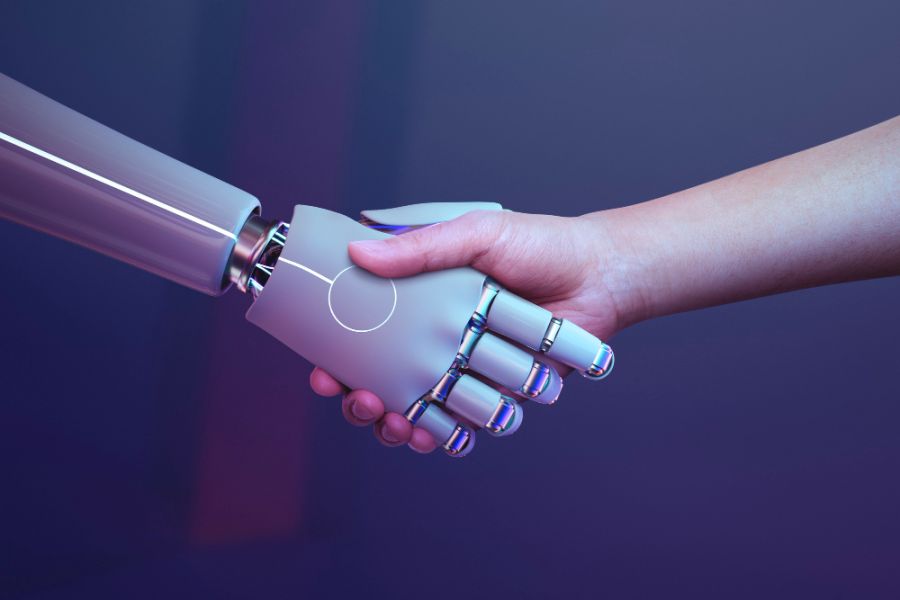As AI advances, certain professions remain resistant to automation due to uniquely human skills. AI-proof careers, including healthcare professionals, creative artists, leaders, educators, and computer system analysts. Emphasising human qualities like empathy, creativity, and critical thinking, these roles ensure job security and highlight the importance of human-AI collaboration in the future workforce.

As artificial intelligence (AI) continues its rapid advancement, the job market faces substantial transformation. According to a report by Goldman Sachs, by 2030, 300 million jobs could be replaced by automation. With the potential for such sweeping changes, concerns about career stability are understandable. However, not all sectors are equally vulnerable. According to recent studies, approximately 46% of tasks in administrative roles and 44% in legal professions are automatable, highlighting the variability in AI’s impact across different fields.
Yet, the future is not entirely bleak.
Certain professions rely on uniquely human skills that render them resistant to automation. Career expert Mukesh Choudary of Finoit emphasises the resilience of roles that require empathy, creativity, and complex decision-making—qualities that AI cannot replicate. “Certain careers leverage uniquely human skills that make them resistant to automation,” says career expert Mukesh Choudary of Finoit.
Identifying AI-Resistant professions
Research highlights that 46% of tasks in administrative roles and 44% in legal professions are potentially automatable. Despite these figures, the future of work is not as bleak as it might seem. According to career expert Mukesh Choudary of Finoit, “AI can analyse medical data and even assist in surgery but the human touch (for the most part) remains irreplaceable.”
Healthcare professionals: The irreplaceable human touch
AI can analyse medical data and assist in surgical procedures, but it cannot replace the empathy, critical thinking, and trust-building required in healthcare. Doctors, nurses, and therapists play crucial roles that demand a human touch. “The human aspect of healthcare, for the most part, remains irreplaceable,” says Mukesh.
Benefit: A career in healthcare offers the satisfaction of directly impacting lives and providing care that technology alone cannot achieve.
Creative professionals: The unmatched imagination
Creativity is a uniquely human trait that AI can only mimic with human input. Artists, writers, and designers employ their imagination to create works that evoke emotions and tell compelling stories. Mukesh emphasises, “Creativity is a hallmark of humanity that AI can only pale in comparison to without human intervention.”
Benefit: Creative professionals leave a lasting mark on society through genuine forms of artistic expression.
Leaders and strategists: The human insight
AI excels in analysing data and generating insights, but it lacks the ability to inspire, negotiate, and adapt like human leaders. “Inspiring teams and making complex decisions require human judgment and insight,” Mukesh notes. Leaders understand their teams on a personal level, an area where AI currently falls short.
Benefit: Leadership roles allow individuals to shape the future of organisations and make significant contributions on a larger scale.
Educators and trainers: The personal touch in teaching
Teaching involves more than just knowledge transfer; it requires mentoring, inspiring, and catering to each student’s unique needs. Educators and trainers foster critical thinking and creativity, aspects of education that AI cannot replicate. Mukesh points out, “Teaching is about providing a personal touch and instilling discipline, which is vital to effective education.”
Benefit: Educators influence future generations and instil a love for learning with genuine human warmth.
Computer system analysts: The technological guardians
In an increasingly automated world, human expertise remains crucial for maintaining, updating, and improving complex software and hardware systems. Computer system analysts play a vital role in ensuring the smooth operation of these systems. They review system capabilities, control workflows, schedule improvements, and enhance automation. “These professionals are the wizards behind the curtain,” Mukesh says, “making everything run smoothly.”
Benefit: Analysts keep humans at the forefront of technological advancements while ensuring essential systems function seamlessly.
The future of work: Human-AI collaboration
The key takeaway from these insights is that AI is here to augment, not replace, human jobs. The future workforce will likely see a collaboration between humans and AI. Mukesh concludes, “Embrace lifelong learning, develop strong communication and interpersonal skills, and focus on areas requiring creativity, empathy, and critical thinking. These skills will ensure you remain relevant amidst technological advancements.”
As AI continues to evolve, these AI-resistant professions will remain integral to the workforce, showcasing the irreplaceable value of human abilities in an increasingly automated world.

Pallavi Singal is the Vice President of Content at ztudium, where she leads innovative content strategies and oversees the development of high-impact editorial initiatives. With a strong background in digital media and a passion for storytelling, Pallavi plays a pivotal role in scaling the content operations for ztudium’s platforms, including Businessabc, Citiesabc, and IntelligentHQ, Wisdomia.ai, MStores, and many others. Her expertise spans content creation, SEO, and digital marketing, driving engagement and growth across multiple channels. Pallavi’s work is characterised by a keen insight into emerging trends in business, technologies like AI, blockchain, metaverse and others, and society, making her a trusted voice in the industry.









